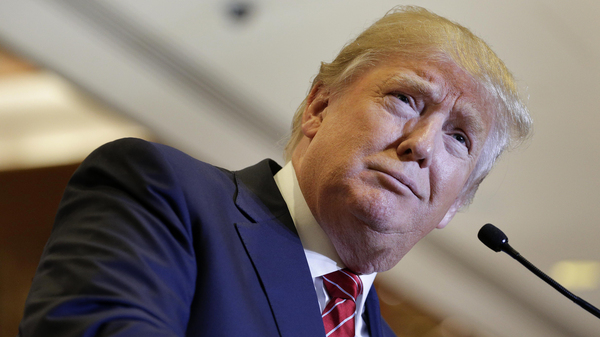How Donald Trump would be able to not pay income taxes for 18 years

Go Deeper.
Create an account or log in to save stories.
Like this?
Thanks for liking this story! We have added it to a list of your favorite stories.

We don't really know what Donald Trump paid in taxes, because unlike every other major presidential candidate in the last four decades, the GOP nominee has refused to release his tax returns. But the New York Times offers a tantalizing theory that Trump could have legally escaped income tax liability on hundreds of millions of dollars, thanks to staggering losses from two decades ago.
That he could have done so while still enjoying a lavish lifestyle is testament to both the flexibility of the federal tax code—especially when it comes to real estate professionals—and the willingness of creditors and investors to keep propping up a businessman who had already lost nearly a billion dollars.
The Times account is based on a fragmentary sample of Trump's tax returns from a single year that were leaked to the newspaper by an anonymous source. Trump's former accountant confirmed their authenticity for the paper. The forms show that in 1995, Trump claimed a business loss of nearly $916 million. Much of that likely resulted from Trump's business losses in previous years, including money-losing casinos in Atlantic City and the Trump Shuttle airline.
At the time, the tax code allowed such losses to be "carried forward" up to 15 years, offsetting income and reducing or even eliminating tax liability and carried backward on income up to 3 years prior. (The allowance has since been changed to carry forward 20 years and carry back 2 years.) The code is particularly flexible when it comes to real estate professionals like Trump.
Turn Up Your Support
MPR News helps you turn down the noise and build shared understanding. Turn up your support for this public resource and keep trusted journalism accessible to all.
A doctor who owns a rental property and loses money on it can only use that loss to offset rental income, not what he or she earns practicing medicine.
But thanks to more generous allowances for real estate professionals, Trump would have been allowed to use his casino losses to offset income from unrelated work, including the millions he earned as star of "The Apprentice" television show, or licensing his name to the maker of Trump neckties.
"Here's the magic of real estate," says Lee Sheppard, contributing editor of Tax Notes, a Washington-based journal. "Congress, which writes the tax laws, affirmatively subsidizes commercial real estate through the mechanism of the tax code."
The favorable treatment of real estate developers is just one example of the way the tax code rewards real estate development and investment. The popular tax deduction for home ownership is another, and one of the costliest in the overall code.
"Real estate is a very powerful lobby in Washington," Sheppard says. "There used to be a running joke that it would be cheaper for the government to make real estate tax-exempt."
The losses cited on Trump's 1995 return were so massive, he could have earned up to $50 million dollars a year for nearly two decades without owing any income tax.
"Mr. Trump was a spectacular loser," said Steve Rosenthal, a former staffer for the Joint Congressional Committee on Taxation and a senior fellow at the Tax Policy Center.
Because the tax records obtained by the New York Times are fragmentary, we don't know the detail behind the losses that Trump claimed that year. A separate statement describing the losses was not included in the leaked documents.
"That's why we should see his tax returns," said Rosenthal. "Was Mr. Trump really losing money that spectacularly? Or was he ginning up his losses" through accounting maneuvers?
It's a provocative question for a presidential candidate whose campaign is largely based on his purported success as a businessman.
"Donald Trump has a long, well-documented history of reporting different numbers" to different audiences, said David Cay Johnston, an investigative reporter, tax expert, and author of The Making of Donald Trump. Trump's Atlantic City casino empire, overbuilt and overleveraged, hemorrhaged money during the 1990s and ultimately filed for bankruptcy. Investors in his public company lost more than $1 billion, and a number of businesses that worked on the casinos went unpaid. But debts that were personally guaranteed by Trump were transferred to others, while Trump himself collected tens of millions of dollars in salary and bonuses.
For years, investors and creditors went along in the belief that Trump and his lavish public lifestyle added value to the aspirational casino business.
"If his lifestyle is part of the brand, his lifestyle is kind of a business expense in itself," said Sheppard. Copyright 2019 NPR. To see more, visit https://www.npr.org.


